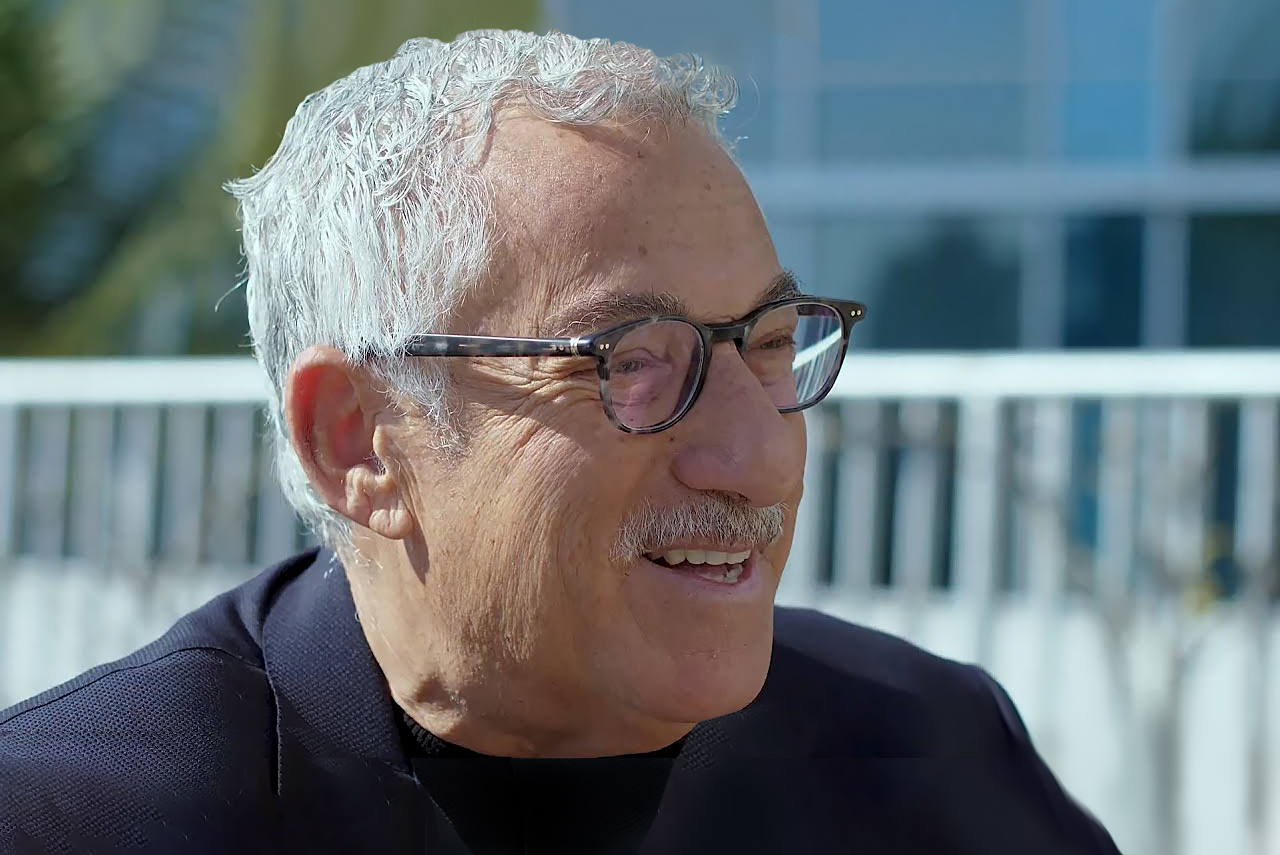
Neil Leshner was treated at Saint John’s for metastatic kidney cancer.
Neil Leshner is 73 and was diagnosed with stage 4 kidney cancer after 18 years of being cancer-free. In 2007, he had a nephrectomy (removal of one or both kidneys). However, in 2019 cancer returned and it spread to multiple organs: spleen, lungs, and pancreas.
This time, he would require advanced treatment, and not just surgery. But Neil really didn’t think he had cancer. Even though his physicians diagnosed him with metastatic kidney cancer in August of 2019, it took a long time for him to accept that he had cancer. “I felt too good,” he said in his testimonial.
“I still felt so good. I didn’t want to have any treatment.”
– Neil Leshner
In a hypothetically conversation with his medical oncologist, Neil asked Dr. Przemyslaw Twardowski at Saint John’s Cancer Institute, “If I don’t receive treatments how long do I have before I would feel the effects of cancer?” Dr. Twardowski told him he had 6 months before he would start feeling bad. That was enough to move Neil towards treatment, not feeling well. Neil enjoys life and so he didn’t want anything to get in the way of it.
“Dr. T. saved my life.”
– Neil Leshner
Neil Leshner’s interview after treatment for stage 4 kidney cancer
Neil Leshner shares his cancer journey at Saint John’s Health Center in hopes that it will help others.
Near the end of his treatment period, 2 years later, a single tumor remained in his pancreas. His team recommended a pancreatectomy with Dr. Anton Bilchik, Chief of General Surgery, VP of Saint John’s Health Center, and Medical Director of Saint John’s Cancer Institute. His pancreatic surgery was textbook.
“Dr. Bilchik is incredible.”
– Neil Leshner
Saint John’s patients have revealed the success of their treatment is attributed to a team of specialists. Having so many experts under one roof can offer significant benefit, reducing the stress that can be associated with navigating the healthcare system. At Saint John’s, it is different. Every specialist is supported by a team that is interconnected with other teams. Health care at Saint John’s becomes seamless among providers; it’s a community. “I’m blessed for Saint John’s, and I’m not just saying this,” Neil explains.
Neil is currently in remission and comes back every 6 months for his follow-up scans.
As luck would have it, Neil remains positive.
In an event that rocked Los Angeles, Neil and his family lost their home in the Palisades fire this year. When shooting this testimonial, he was living in a hotel with his wife. Having gone through what is already a life-changing event, twice now, the loss of his home didn’t affect his positive attitude and zest he developed for living life. He remarked, “I’m Neil Leshner. I’m homeless, but I have a home. I have home right here if I need it. I have a home with my friends.” Even in moments of uncertainty, rebuilding is the best and only move forward.
“Nothing is the end of world as long as we’re here.”
– Neil Leshner
What is kidney cancer?
Kidney cancer can be called renal cell carcinoma or clear cell carcinoma depending on the biology of the cells. The kidneys filter the blood, makes pee, and keeps your blood pressure and red blood cell count in check. When a solid mass forms and spreads it is considered cancerous and the only way to properly diagnose a cancer is through biopsy.
Click to learn more about Kidney Cancer: Symptoms, Risk Factors, Diagnosis, Stages, and Treatment.
Metastatic kidney cancer
Kidney cancer that has spread to other organs is referred to as metastatic kidney cancer, while nearly all patients who are diagnosed with kidney cancer have already reached stage 4 because the symptoms are practically invisible. In fact, most people find out through a scan of an unrelated issue.
Kidney cancer that spreads to other parts of the body can metastasize to:
- Lungs: Kidney cancer often spreads to the lungs through the bloodstream, as the lungs are a common site for metastasis due to their extensive network of blood vessels.
- Bone: Cancer cells can also travel to the bones via the bloodstream, leading to bone pain and fractures as the disease progresses.
- Lymph Nodes: Kidney cancer spreads to nearby lymph nodes through the lymphatic system, which is part of the body’s drainage and immune system.
- Liver: The liver can be affected when cancer cells enter the bloodstream and travel to this organ, which is rich in blood supply.
- Adrenal Glands: Located above the kidneys, adrenal glands are often invaded by kidney cancer cells due to their proximity and shared blood vessels.
- Brain: Kidney cancer cells can metastasize to the brain by traveling through the bloodstream, although this is less common compared to other sites.
Treatment for metastatic kidney cancer
Treatment for metastatic kidney cancer typically involves a combination of systemic therapies designed to target cancer cells throughout the body. Immunotherapy is a key component, utilizing drugs like checkpoint inhibitors to boost the immune system’s ability to recognize and destroy cancer cells. External beam radiation therapy is another option, where high-energy rays are precisely aimed at tumors to shrink them and alleviate symptoms. This type of radiation is often used for palliative care to manage pain and other complications caused by metastases.
Surgery can also play a crucial role, especially in removing the primary tumor and any accessible metastatic sites. In some cases, surgery is combined with other treatments to improve outcomes and manage symptoms more effectively. The choice of treatment depends on various factors, including the patient’s overall health, the extent of cancer spread, and specific characteristics of the tumor. Each therapy aims to control the disease, improve quality of life, and extend survival.
What is the prognosis for advanced kidney cancer?
The prognosis for advanced kidney cancer, particularly metastatic kidney cancer, is generally poor. Approximately 13 percent of patients with metastatic kidney cancer survive for five years after their diagnosis. This low survival rate reflects the aggressive nature of the disease, and the challenges associated with treating cancer that has spread to other parts of the body. Factors influencing prognosis include the patient’s overall health, the extent of metastasis, and how well the cancer responds to treatment.
Despite these statistics, advancements in treatment options such as targeted therapies, immunotherapy, and combination treatments have improved outcomes for some patients. Each patient’s prognosis is unique, and ongoing research continues to explore new ways to improve survival rates and provide hope for those affected by advanced kidney cancer.
Dr. Twardowski’s Care Mantra
Dr. Przemyslaw Twardowski is well known for his warm personality and compassionate approach to treating urologic cancers. With decades of experience, he has dedicated his career to managing complex cases of prostate, bladder, kidney, and testicular cancers. “We try to treat patients on the best available science, yet at the same time, every patient requires a nuanced approach that is tailored to the individuals circumstances,” and this is because the high level scientific evidence may not be available for every circumstance, says Dr. Twardowski. In Niels case, after prolonged treatment there was still residual disease in his pancreas and that needed to be resected.
Patients consistently praise his ability to listen attentively and provide personalized care, ensuring that each individual’s unique circumstances and values are considered. His commitment to state-of-the-art treatment and his empathetic demeanor have made him a trusted and respected figure in the field of oncology. Dr. Twardowski’s holistic approach not only focuses on effective medical interventions but also on enhancing the overall well-being of his patients.
Neil Leshner’s Medical and Surgical Doctors
 |
 |
|
Przemyslaw Twardowski, MD – Medical Oncologist, Director of Clinical Research, Urology and Urologic Oncology
|
Anton Bilchik, MD – Chief of General Surgery,
Director of Gastrointestinal and Hepatobiliary Program |


